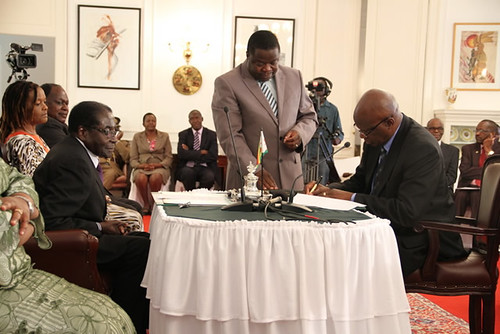
Minister of Finance Patrick Chinamasa being sworn in to a new cabinet post for the Republic of Zimbabwe. The ceremony took place on September 11, 2013., a photo by Pan-African News Wire File Photos on Flickr.
Informal sector key to growth
January 16, 2014
Business Editor
Zimbabwe Herald
ZIMBABWE has to face the reality that the informal sector is now the dominant force of the economy, Finance and Economic Development Minister Patrick Chinamasa has said. Giving the keynote address at the Mandel-Gibbs 2014 Economic Symposium yesterday, Minister Chinamasa said there were more economically active people in the informal sector compared to those in the formal sector.
“How can we tap value from the informal sector? They are not contributing value to the fiscus. There are no linkages between the formal and informal sector,” he said.
World Bank country economist Ms Nadia Piffaretti said it was high time Government started paying attention to the massive informal sector which was now at 46 percent compared to South Africa at 17 percent and Malawi at 13 percent.
She noted that SME’s were at 60 percent post dollarisation.
“How well are you treating start ups,” she said. “For example, Apple started in a garage but now it is one of the most valuable companies in the world.
Government should not underestimate start ups.” She said the push for foreign direct investment should not be confined to the Government alone but should be initiated by domestic entrepreneurs who are searching for new technology.
Ms Piffaretti said while the global economy was stabilising with an anticipated 2013 growth rate of 3,6 percent, Zimbabwe would experience some problems as they were in the middle of falling international prices and the weakening of the rand against the US dollar.
“The rand has lost a lot of ground and that situation is not going to reverse anytime soon. And this presents problems because the economy experienced a rebound when the dollar was weak but now when it is going the opposite direction Zimbabwe finds itself in serious problems as it has a weak economy being funded by a strong dollar.”
She added: “That brings in the issue of competitiveness. It’s cheaper to import than to export therefore the import bill will continue rising on a permanent basis. On the other hand investors at the moment get nice returns on dollar assets.”
Since 52 percent of Zimbabwe’s trade — two-thirds of exports and 43 percent of imports — is with South Africa, the currency gap is a problem. Zimbabwe gains from cheaper imports from SA (but two thirds of the exports are more costly in SA.
According to the International Monetary Fund estimates, the value of the US dollar today is 15 percent too strong for Zimbabwe, making the economy highly uncompetitive.
Both Minister Chinamasa and Ms Piffaretti said there was need for creativity and innovation in addressing the country’s economic problems.
“Let us not have the belief that things and events can happen effortlessly, that you can move mountains. Let us all not be in the physical sense be (Pastor Emmanuel) Makandiwa followers,” Minister Chinamasa said.
The minister criticised procrastination especially within the private sector as he called for collectivity in coming up with solutions to rescue the economy.
He said challenges facing the economy such as sanctions that Western countries imposed should not be used as excuses for failure to come up with solutions.
“You read in newspapers people saying, we will not do anything because of elections, the elections happen; we will not move until the Minister of Finance has been appointed; The Minister is appointed, you say he must deliver a budget; he has delivered a budget and now the question is what are you waiting for,” he queried.
Minister Chinamasa chided local banks for slacking in mobilising funding to channel to productive sectors of the economy.
“I have been going through what the banks in this country were doing before and the sad conclusion is I get this feeling that they are imposing sanctions on their own country,” he said.
“Before these problems, some of these banks were borrowing lines of credit to on-lend to their customers, US$800 million annually and now US$40 million, the question is why they are not doing things that they were doing before. Is it because they do not like the Government, they do not like the country, what is the problem?” he asked.
He accused the banks of implementing some exit strategy.
No comments:
Post a Comment